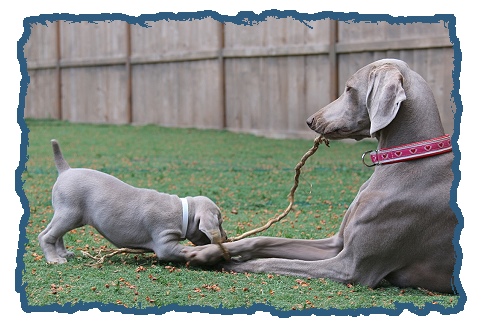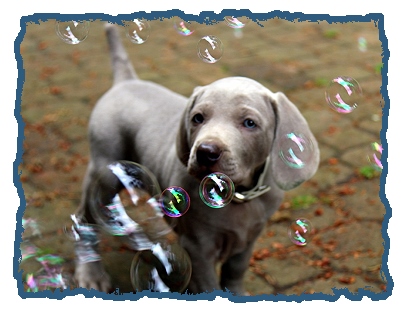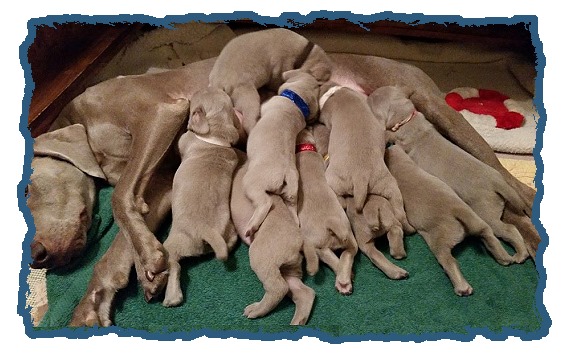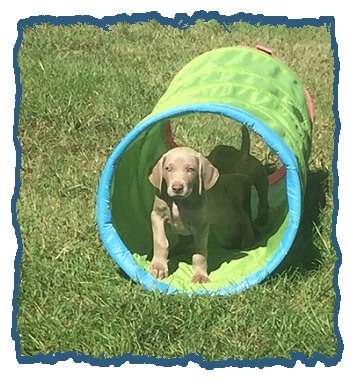
WCA Breeder Referral

The best way to ensure a long and happy relationship with your Weimaraner is to purchase from a responsible breeder. While the WCA does not endorse or recommend specific breeders, we do suggest several resources to locate ethical, responsible breeders.
The WCA recommends puppy buyers begin the search process by contacting a local club in your area. A list of local Weimaraner clubs can be found here: Weimaraner Regional Clubs
If there is no local WCA club based in your vicinity; or there are no pups currently available from WCA member breeders, you may contact the WCA National Breeder Referral office:
WCA Breeder Referral
Billie Thompson
513-688-0943
wcareferral@fuse.net
Remember, finding a good puppy is up to you. Asking the right questions is the most important part in finding a good breeder. There are many characteristics that identify a responsible breeder. Please find below a few of those listed.

• They personally screen and select homes, will mentor and advise new owners, will sell only to approved homes. They value their reputation within the breed community.
• Evaluate the health of the dam and sire before breeding including health tests available such us OFA (hip x-ray certification), Penn-Hipp (hip joint laxity), CERF, etc. Evaluate the temperament, structure and prey drive of sire and dam and puppies.
• Be involved in show and performance events to help ensure that their dogs display the desired physical and behavioral traits desired for the breed.
• Raise their litters with much planning, quality care and socialization.
• Be willing to take back a dog of their breeding at any time in the dogs life regardless of the reason.
How To Choose A Weimaraner Breeder
 How do you, as a prospective Weimaraner owner, go about finding a Responsible Breeder? The best answer is, ask a lot of questions, do your homework and take your time! Don’t buy on impulse. Becoming an informed shopper increases the likelihood of a successful dog/owner relationship.
How do you, as a prospective Weimaraner owner, go about finding a Responsible Breeder? The best answer is, ask a lot of questions, do your homework and take your time! Don’t buy on impulse. Becoming an informed shopper increases the likelihood of a successful dog/owner relationship.
Responsible Breeders want what is best for the Weimaraner breed and they associate themselves with organizations that seek to promote, protect and improve the Weimaraner, such as the Weimaraner Club of America and other local Weimaraner Clubs. Many reputable breeders are also associated with All-Breed Kennel Clubs in their area.
 When you decide the time is right for a puppy, spend at least as much time looking for one as you would when shopping for a new car. A puppy is a long-term commitment; hopefully he’ll be with you for ten or twelve years or more. The effort you put into finding a quality breeder will reward you many times over. You will have continued access to a knowledgeable resource - your breeder. You will not get this type of support from a pet store or from a casual breeder. You will need to decide for yourself whether or not a particular breeder is right for you. Finding a breeder you can trust is very important. When you buy a puppy, you are making a commitment for the life of the dog. While no breeder can guarantee that you will be getting the “perfect” puppy, you should feel that the puppy you have chosen was bred to be what you are looking for in a Weimaraner. You may have to wait. Responsible breeders do not always have puppies available. A couple of litters per year is typical, and many good breeders only have a litter every few years.
When you decide the time is right for a puppy, spend at least as much time looking for one as you would when shopping for a new car. A puppy is a long-term commitment; hopefully he’ll be with you for ten or twelve years or more. The effort you put into finding a quality breeder will reward you many times over. You will have continued access to a knowledgeable resource - your breeder. You will not get this type of support from a pet store or from a casual breeder. You will need to decide for yourself whether or not a particular breeder is right for you. Finding a breeder you can trust is very important. When you buy a puppy, you are making a commitment for the life of the dog. While no breeder can guarantee that you will be getting the “perfect” puppy, you should feel that the puppy you have chosen was bred to be what you are looking for in a Weimaraner. You may have to wait. Responsible breeders do not always have puppies available. A couple of litters per year is typical, and many good breeders only have a litter every few years.
 Responsible breeders answer buyers’ questions, keep puppies they cannot place, allow bitches to recover sufficiently from one breeding before doing another, and take back any puppy that does not work out. They breed dogs because they admire their breed and want to contribute to its betterment. They guarantee their pups free of genetic diseases common in their breed and in a written contract of sale will guarantee they will assist the new owner in the future should something unexpected occur. They consider the puppies they produce to be their responsibility for the life of that puppy, so they follow-up frequently to see what’s going on. The Responsible breeder will require a signed contract. This contract is for the benefit of the buyer, the seller and the puppy! Contracts are encouraged by the WCA Code of Ethics, because they define the terms of the sale. It should clearly state the expectations of each party so that there are no undisclosed assumptions by either the buyer or the seller. Responsible breeders evaluate their puppies as show and breeding quality or pet quality and sell pet puppies with an AKC Limited Registration and/or spay-neuter clause.
Responsible breeders answer buyers’ questions, keep puppies they cannot place, allow bitches to recover sufficiently from one breeding before doing another, and take back any puppy that does not work out. They breed dogs because they admire their breed and want to contribute to its betterment. They guarantee their pups free of genetic diseases common in their breed and in a written contract of sale will guarantee they will assist the new owner in the future should something unexpected occur. They consider the puppies they produce to be their responsibility for the life of that puppy, so they follow-up frequently to see what’s going on. The Responsible breeder will require a signed contract. This contract is for the benefit of the buyer, the seller and the puppy! Contracts are encouraged by the WCA Code of Ethics, because they define the terms of the sale. It should clearly state the expectations of each party so that there are no undisclosed assumptions by either the buyer or the seller. Responsible breeders evaluate their puppies as show and breeding quality or pet quality and sell pet puppies with an AKC Limited Registration and/or spay-neuter clause.
 Expect caring breeders to be nosy! They will ask many questions about your lifestyle, your other pets and your intentions with the new pup. They personally screen and select homes, will mentor and advise new owners, will sell only to approved homes especially when they guarantee to take the dog back if it does not work out.
Expect caring breeders to be nosy! They will ask many questions about your lifestyle, your other pets and your intentions with the new pup. They personally screen and select homes, will mentor and advise new owners, will sell only to approved homes especially when they guarantee to take the dog back if it does not work out.
Questions To Ask As You Look For A Breeder:
1. Ask what clubs and or organizations they belong to? Are they members of the Weimaraner Club of America? Do they abide by the Code of Ethics? Are they members of a local Weimaraner Club? An All-Breed Club? A responsible breeder will be involved in show and performance events to help ensure that their dogs display the desired physical and behavioral traits desired for the breed.
2. Ask to see Orthopedic Foundation for Animals (OFA) Health Certifications or Penn Hip evaluations. The WCA recommends OFA certification for hips, thyroid and eyes to be CHIC (Canine Health Information Center) certified.
3. Do both the sire and dam have the recommended health clearances of the WCA? The more relatives in the pedigree that have the recommended clearances the better. A responsible breeder will keep track of these statistics and honestly discuss any problems that have occurred and what steps they are doing to prevent them from occurring.
4. What guarantees do you give on hips or other health problems that may arise? What is your policy on money refunded or help with medical bills? Will you take the dog back at any time for any reason? This is the hallmark of responsible breeding!
 5. What kind of congenital defects are present in the breed? Avoid anyone who says “none” - there are genetic problems that are present in all breeds.
5. What kind of congenital defects are present in the breed? Avoid anyone who says “none” - there are genetic problems that are present in all breeds.
6. Ask if the puppies have been checked by a veterinarian? Had their first shots? (Please see the WCA recommendation on vaccinations). Are the tails docked and dewclaws removed? Important records should be in writing.
7. Check pedigrees. How many champions and/or titled dogs are represented? Are there a majority of titled dogs in the first two generations? The term “champion lines” means nothing if those titles are back more than three generations or if there are only a few in the whole pedigree.
8. Ask how long they have been in the breed? Are they involved in other breeds as well? How many litters have you had? You probably want to avoid anyone who has switched breeds every couple of years – look for someone that has experience with the breed and only breeds one or two different breeds. If they are new in the breed, do they have a mentor? The more experience the better.
9. Ask to see the Dam. It is important to at least see the mother dog. It would be ideal to see both parents but many times the sire doesn’t live nearby. Check out the general health and temperament of the female dog.
10. What are your overall feelings about the environment where the pups are raised? The puppies should be well cared for. They should have a clean and comfortable area. They should be properly socialized with people. Look at the condition of the other dogs on the premises. Trust your instincts!
11. Is the breeder knowledgeable about raising puppies, critical neonatal periods, proper socialization techniques? Puppies that are raised without high exposure to gentle handling, human contact and a wide variety of noises and experiences or are removed from their dam or littermates before seven weeks of age may exhibit a wide variety of behavioral problems. Temperament, a genetic trait carried over from the parents still needs development from the early beginnings of a puppy’s life. The breeder should provide extensive socialization and human interaction to the puppies in the litter.
12. Have the puppies’ temperaments been evaluated and can the breeder guide you to the puppy that will best suit your lifestyle? A caring breeder will know the puppies and be able to show you how to test them so that good matches can be made.
 13. Ask for a copy of the contract before you see the puppy so you can thoroughly review it. Do you understand the terms of the contract? Can you comply with all the terms? Does the breeder require a co-ownership? If so, then thoroughly review all that is expected of both the buyer and the seller. What environmental requirements are placed on you, such as mandating a fenced yard?
13. Ask for a copy of the contract before you see the puppy so you can thoroughly review it. Do you understand the terms of the contract? Can you comply with all the terms? Does the breeder require a co-ownership? If so, then thoroughly review all that is expected of both the buyer and the seller. What environmental requirements are placed on you, such as mandating a fenced yard?
Take the time to read everything you can find about Weimaraners. Speak with other Weimaraner owners and learn as much as you can about the breed. Visit the Weimaraner Club of America website www.weimeranaerclubofamerica.org Consumer education is the most important tool available.
A Word on Blue and Long Hair Weimaraners – Although the Long Hair Weimaraner is accepted in every country besides the USA, the long hair variety of coat will be disqualified from the show ring. It may, however, compete in all other American Kennel Club and WCA activities with a DQ (spay/neuter) Certificate from the WCA National Office. Since a DNA test is available to determine if your dog is a Long Hair carrier, breeders can choose to test prior to breeding.
There are no countries that recognize the Blue Weimaraner variety. Blue Weimaraners are not rare. They are deliberately produced. The purebred heritage of the Blue is a matter of dispute. They will be disqualified from the show ring. Like the Long Hair they can be registered with the American Kennel Club and can compete in WCA activities with a DQ (spay/neuter) Certificate from the WCA National Office.
Weimaraner Club of America Approved September 8, 2010








